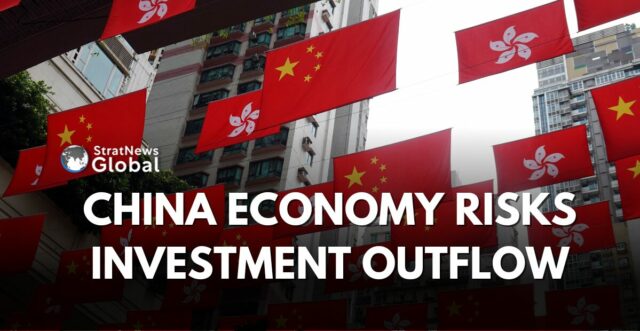Domestic Chinese investors are losing faith in a quick recovery in their home markets. A sliding Yuan and significant cash outflows from mainland China into Hong Kong are clear indicators, analysts say. Instead, they are seeking better-yielding assets in the neighbouring financial hub.
Yuan Depreciation and Investment Flows
This week, the Yuan hit seven-month lows, and was coupled with a reversal in equity investment flows into China. Analysts note an increase in Yuan deposits in Hong Kong as mainland investors leverage limited offshore investment channels for higher returns. Companies are also preparing to pay annual dividends, further straining the currency.
“Sentiment on China soured over the past month as the market has rallied ahead of improvement in macro data which continues to disappoint,” said Gary Tan. He’s a portfolio manager at Allspring Global Investments. Tan highlighted that the perception of mainland markets has improved from being considered “uninvestible.” But, he sees investor patience wearing thin due to delays in government stimulus, especially for the ailing property sector.
Market Performance and Investor Movements
The Shanghai benchmark stock index rose 20% between early February and mid-May. But has since declined by 6%. Foreign investors, who had re-entered the market since February, have turned into net sellers this month. They withdrew 33 billion Yuan ($4.54 billion) via the Stock Connect Scheme. In contrast, domestic investors have channelled 129 billion Yuan into Hong Kong through the same scheme.
Analysts are advising caution. That’s not only because of the People’s Bank of China’s rate easing. But also the upcoming July plenum of the Chinese Communist Party. The plenum will shape future economic and fiscal policies.
Chi Lo, senior market strategist for Asia-Pacific at BNP Paribas Asset Management, noted foreign funds are currently neutral on Chinese stocks. But, he recognises a shift towards a more positive outlook. “Beijing is likely to keep the easing measures more progressively than they were in the past 18 months. And the plenum will likely reiterate that policy direction,” Lo said.
Impact on Hong Kong’s Financial Landscape
Mainland cash inflows have pushed Yuan deposits in Hong Kong to record levels. Official data for April shows 1.09 trillion Yuan ($150 billion) in deposits. That’s nearing peaks last seen in January 2022. Ju Wang, head of Greater China currency and rates strategy at BNP Paribas, noted that mainland investors are flocking to Hong Kong. That according to him is for better returns on an offshore Yuan, given low yields at home and expectations of further easing.
Persistent southbound flows and the traditional June-July dividend transfers by Chinese firms have also led to selling offshore Yuan. And increasing demand for Hong Kong Dollars. Since early May, the CNH has fallen 1.9% against the Hong Kong Dollar.
Additionally, expectations of peaking U.S. Dollar rates as the Federal Reserve prepares to ease policy are drawing money into Hong Kong. This is due to the Hong Kong Dollar’s peg to the U.S. Dollar, which significantly impacts its economy. “U.S. rate cuts are very important for Hong Kong’s liquidity because of the currency peg. Once the Fed starts cutting rates, I think we will be flush with liquidity here, which will push up asset prices,” said Lo.
($1 = 7.2610 Chinese yuan renminbi)
(With Inputs from Reuters)
Research Associate at StratNewsGlobal, A keen observer of #China and Foreign Affairs. Writer, Weibo Trends, Analyst.
Twitter: @resham_sng





